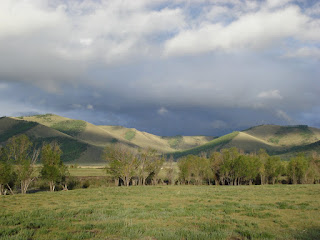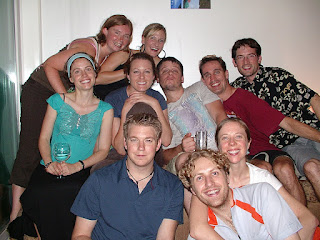The mystery and grandeur of this country and its history, however, comes to a grinding halt in the capital city. Half-built, congested, busy and polluted, the city is a far cry from what once was a gorgeous valley here in north-central Mongolia. As people move off the steppe and into the city, the usual urban problems crop up, including water pollution and overuse, poverty and crime. The city has under a million people, so it is easily walkable. The number of foreigners in the city suprised us, especially compared to Korea. Even though it is small, it's a metropolitan city: it's possible to eat Turkish, Italian, Mexican, Russian, German and almost any other European food here. The Mongolian people in the city are an entertaining mix of dusty horse-riders, decked-out young women, and traditionally-dressed elders with the life of the steppe wrinkled into their faces.

We didn't come all this way, however, to see the city. The steppe, the desert, and the rolling hills in between have captured imaginations for centuries, and, if all goes well, will continue to do so. We hopped on a mini-bus with an American family and a German/French couple, and drove 4 hours outside of UB to the Khan Khentii Strictly Protected Area to stay in a low-impact ger camp. The area we stayed in was absolutely wonderful. No cars, no electrical wires, no cell phones, and virtually no people. Night was silent and totally dark, except for the sky, which shone with thousands of stars and the shadowy outline of the Milky Way. Our days were spent wandering the grasslands by foot or by horse, or floating down the Tuul River by raft. The birds were fantastic - a lot of new ones for us, but the most impressive were the raptors - eagles, kites and buzzards are seen floating effortlessly almost everytime you incline your head towards to the blue sky. The people out there live a peaceful and quiet life, either raising herds, growing vegetables or tending to their family's needs in their ger. The ger itself is a wonderful invention, and upon asking how much they were, we were told that a good one goes for a yak, while less-quality ones will sell for a healthy horse. We'll keep that in mind.

No roads, people or power lines as far as the eye can see . . . ahhhhh:)
The camp itself had wonderful food, kept cold in the fridge by a combination of solar panels and a wind rotor. The gers are totally collapsable, leaving no mark on the environment except for the rings on the earth under them when they pack it up and move to higher ground before the onset of the killer winter. Sitting in late evening on our hilltop watching the sun set over the tranquil valley was gourmet food for our soul, and we felt rejuvenated and revived after our busy last few months in Korea.

We then had 3 more days in the city before heading off to China. However, after getting more and more depressed as we got into the city, we headed right back to a travel agent after we found a hostel to stay in. We had brought our tent etc to camp, and hadn't used it yet, so we decided to hire a driver and head back to the hills, this time to Terelj National Park, just south of the Khan Khentii area. After taking the rugged jeep through rivers, up mountains and through passes, we ended up next to the Tuul River overlooking a perfectly still mountain valley with nothing but the sound of wind, the birds, and distant cattle to keep us company. The driver, a 62-year old Mongolian named Konchik, spent most of his time in local gers seeing old friends once we got settled in a perfect camp spot. We did teach him some cards, however, and shared many laughs while trying to communicate through sign language and facial contortions. It was a wonderful end to our time here in Mongolia, a country which we will come back to, not for the city, but for the amazing country, that itself reminds us so much of home.
The greatest gift we received from Mongolia was the feeling of inspiration: somewhere in the world there are people living in harmony with their surronding environment, and this country, although fighting huge changes, is in a position to make decisions to protect their greatest resource - the steppe and deserts where past peoples helped create one of the world's largest empires, and who could again rise in the world's eye as a country who takes a stand against the environmentally destructive path so many other countries have chosen.
 Life on the Steppe is often harsh, but the summer affords life some growing room.
Life on the Steppe is often harsh, but the summer affords life some growing room.We can only hope our next journey here will find the countryside as quiet and healthy as we did this time. We're off tonight at 8:20 on a train to the Chinese border, and tomorrow we'll find some way to get to Beijing to meet Mom and Dad Styles. We'll be visiting our old haunts, favourtie restaurants and seeing our Chinese friends who helped make China a wonderful place to travel. We're looking forward to the next stage on our journey! Hope you are all well, and thank you for all the emails we've received telling us about what journeys you are on:) We'll write again from Xi'an. For more photos of Mongolia, visit our photo album found on the right hand side of this page under 'Family and Friends'.






